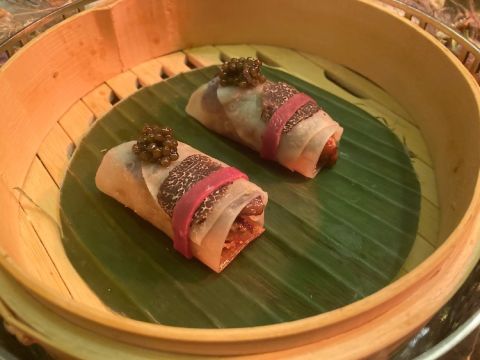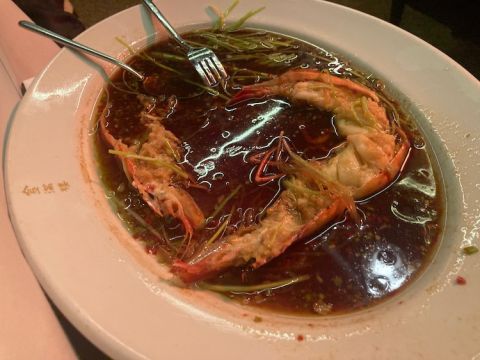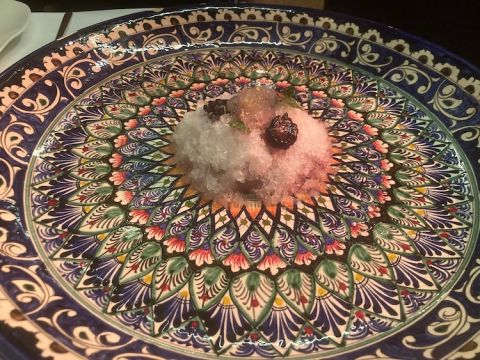I first encountered the talented Andrew Wong in his restaurant A Wong near London’s Victoria station in March 2013 thanks to a tip-off from my brother.
Since then, a lot has changed for Oxford- and LSE-educated Andrew and his wife, the ever-smiling Nathalie. The terrace has been enclosed and insulated – so much so that I had to ask for one of the heaters to be switched off at dinner this week; the kitchens have been renovated; the wine list, glasses and paraphernalia have been seriously upgraded thanks in part to Liberty Wines; and the quality of the Chinese cooking on offer has improved out of all recognition. It was already exceptional in 2013 but on the basis of what we ate, A Wong now richly deserves its two Michelin stars.
And yet apart from these upgrades, not that much appears to have changed. Andrew and Nathalie still extend the warmest of welcomes; both still smile as readily; and it is still possible, via the statue of the prowling horse that sits outside as a feng shui symbol, to pick out that this was the much less ambitious restaurant, Kym’s as it was known in those days, that Andrew’s parents first opened when they settled here from Hong Kong in the 1980s.
But the cooking today is completely modern and entirely Andrew’s and our meal was exceptional. We began with a dish known as A Wong crackers topped with crisply fried seaweed and chilli dipping sauce; a small bowl of Chengdu street tofu with fine-diced peanuts; and a much larger bowl of chilled ‘smacked’ cucumber, the bright green vegetable under a lip- smacking combination of chilli and soy. With this came a single piece each of Peking duck with sweet crunch wrapped elegantly in the thinnest of pancakes and topped with a tiny heap of caviar at one end and a wafer of black truffle bound with a sliver of ham at the other.
We chose four different main courses. First, there appeared in a vast bowl swimming with diced, pickled chillis, a cod’s head – described as a generous serving of Hunan cod cheeks – whose meat the waiter cleverly flaked off the bone; a dish of Sichuanese aubergines topped with garlic flowers; another large dish of a wild tiger prawn in a broth-like sauce described as superior soy (see below) that was so elegant that Jancis ate it by the spoonful; and finally, caramelised beef with beef XO sauce. This was a revelation: long, thin, crisp batons of beef (that I am ashamed to say I ate with my fingers) lying on a sauce of thinly diced, piquant limes with that sweet, spicy XO sauce. With all this we drank a bottle of Weegmüller’s 2020 (on the list as 2019) Scheurebe trocken for £47 and I paid a bill of £189.60, undoubtedly the best-value two-star Michelin meal for a long, long time.
And this included two fabulous desserts. Wong has long maintained that, contrary to popular Western belief, cooking in China does include sweet dishes and from a dessert menu of three different dishes we enjoyed two of striking charm. The first, described as ‘Postcard from Yunnan’, was a winning combination of dark chocolate, black truffle, fermented black bean and glutinous pistachio ice cream. The second, by contrast, was a refreshing coconut water ice, topped with fermented coconut, candied mulberries, yoghurt and mochi, shown below. In each case their presentation was as impressive as their flavours and textures, an attribute shared by all the savoury dishes. Crunch is an important element here.
To discuss what has been an eventful year for them – the winning of the second star; the closure of Kym’s, their second restaurant, in the Bloomberg Arcade; COVID-19 and Brexit – as well as his plans for 2022, I sat down with Andrew a couple of days before we ate there to listen.
‘Nathalie and I have always run this place in the image of a restaurant that we would both enjoy and would wish to visit and to this goal I believe that we will try to initiate two changes from 2022. The first will be a slight reduction in customer numbers. We try our best every day to make the restaurant as good as it can be. We are running at about 55 for dinner and 50 for lunch and I believe that this will go down to 50 for both services. Sorry’, he added immediately when he saw the pained expression on my face.
‘And, perhaps, more obviously, we will move away from an à la carte menu and just offer two tasting menus. One will be a shorter version of our current Taste of China menu and the second will be a specially written menu for the whole table that will take into account the 1,000 or more different allergies that our customers seem to have. In a way I will follow the menu that has been on offer at Hunan in Pimlico for several years.’
‘I think that this will help bring our restaurant into line with the modern era in one other significant aspect. Chinese restaurants have always, because of their inordinately long menus and myriad ingredients, been quite wasteful when it comes to food. This, I believe, will go a long way to stopping this and we may be setting a precedent that other Chinese restaurateurs may choose to follow.’
‘These menus will obviously include a mixture of well-known and more surprising dishes and I think that this is important too. I believe that a lot of customers walk into what they know to be a Chinese restaurant with a predetermined view of what will be on the menu and what they will eat. I would like to change that.’
Has this, I wondered, got anything to do with Brexit and the extra difficulties it has raised, not only in sourcing ingredients but also in trying to find chefs, I asked Andrew.
He laughed. ‘I think that the overall effect of Brexit is that it has made life for all restaurateurs in this country, whatever they are cooking, as difficult as it has been for Chinese restaurateurs for the past generation. Now getting visas for dim sum chefs is as difficult as importing ingredients. For example, until the end of the year we only have 10 kg left of a special flour that is an essential part of our dim sum menu. And now everybody is in the same boat.’
I had by now some idea of the practical difficulties facing this hard-working couple but I wondered whether he was surprised that nobody else had followed them in their chosen path towards seriously refined and creative Chinese food in the UK. ‘No’, came his prompt reply. ‘We were very fortunate because I was able to inherit this restaurant but I do not believe that with labour costs running at 45% today, any financier would look at backing anybody planning to start something similar.’
And what about setting up in a hotel, I wondered, with the heavily Asian Peninsular and Raffles hotels due to open in London from 2022. ‘Well, we have had plenty of enquiries’, he admitted, ‘but here you, as a chef, have to be extremely careful. The general manager may be the most accommodating person but within six months of opening he/she could be off anywhere in the world. It makes us both very wary’, he concluded with another big smile. I think that we will be here until this whole block is due for renovation – and then who knows where we will move to?’
Having turned 40, Andrew Wong seems far more calm, more confident and more relaxed. Was this, I wondered, anything to do with having to close his second restaurant, Kym’s, in the Bloomberg Arcade a year ago?
‘I learnt a great deal from that whole experience’, he said. ‘In particular I was dealing with a number of non-family members who dealt with matters in a completely different manner to the way Nathalie and I do. I spend a great deal of time supporting our chefs because that is the only way that they will learn. It is a profession that demands terribly long hours, lots of repetitive work, some of which is semi-enjoyable at best. But if you can stand it, the rewards can be fantastic’, he concluded with yet another of his trademark grins.
A Wong 70 Wilton Road, London SW1V 1DE; tel: +44 (0)20 7828 8931

















